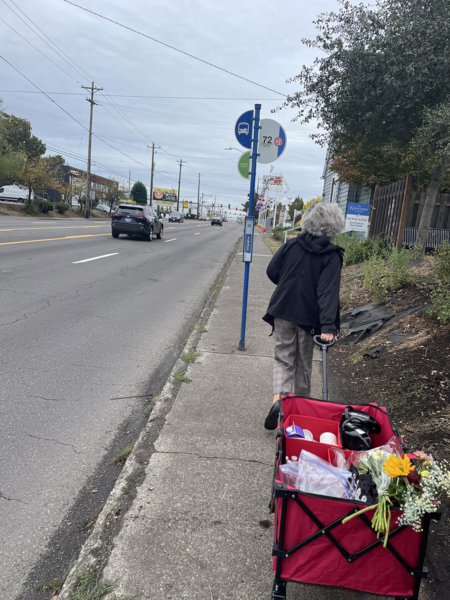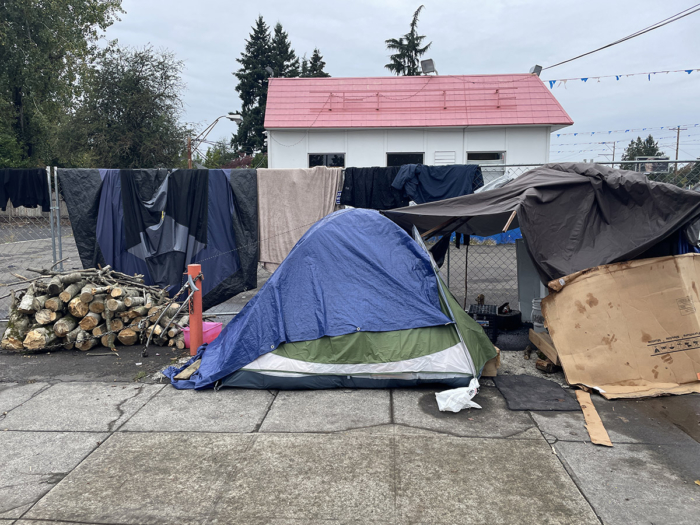Oregon churches respond to escalating homelessness, drug crisesPosted Mar 28, 2023 |
|
[Episcopal News Service] Since the pandemic, the state of Oregon has experienced one of the nation’s sharpest rises in homelessness and drug use.
Churches in the state are taking extraordinary measures to meet a relentless surge in need for food, housing and mental healthcare. They are partnering with public agencies and local non-profits, expanding feeding ministries, engaging in community development efforts, building their own affordable housing projects and even going to court to defend against community opposition to their ministries.
“The pressure has been enormous,” Oregon Bishop Diana Akiyama told Episcopal News Service. “The desire to serve is so strong and the need has been intensified.”
One church is going even further. Saints Peter & Paul Episcopal Church on Portland’s southeast side plans to bulldoze its entire campus and replace it with a four-story supportive housing and social service complex. The Rev. Sara Fischer, the parish’s rector, said she is “75% certain” the new building will include a consecrated Episcopal worship space, though plans are still being finalized.
“I’m focused on Jesus and what Jesus would do with our space,” Fischer said. “The way to be the church is to engage in Christian service.”
The moves come as ongoing post-pandemic disruption and municipal ordinances create a challenging environment for feeding ministries, 12-step recovery groups and other traditional church outreach methods.
Grace Memorial Episcopal Church near downtown Portland has yet to revive a Friday evening meals program suspended during the pandemic because volunteers have not come forward to resume the service, said the Rev. Martin Elfert, Grace’s rector.
“There’s a broader interest in more long-lasting solutions,” Elfert said. “We want to make it so people aren’t hungry to begin with.”

The Rev. Sara Fischer with a cart for their “Red Wagon” ministry at Saints Peter & Paul in Portland, Oregon. Photo: Ellen Clarke
Sally Fraser, a longtime parishioner active in outreach work, said that, though evidence of public drug use on Grace Memorial’s campus remains an issue, demand for a midday distribution of sack lunches three days a week “is less after Covid” as other city feeding ministries resume. The church also stocks an outdoor food pantry cupboard for public use.
Elfert said that at the height of the pandemic, at night the parking lot became what he described as a “chop shop,” where thieves harvested valuable parts from stolen cars. Homeless people slept outside his church’s shuttered sanctuary, defecated behind bushes and deposited syringes and other drug paraphernalia. The church has since trimmed its bushes to discourage people from going to the bathroom or using drugs on church grounds.
A proposal from a local community organization to build a tiny home village for homeless people on church property was withdrawn when the organization concluded that the village “was incompatible” with a summer art camp at the church that serves 1,100 children and some adults with developmental disabilities, said Elfert.
Instead, the 200-member parish is partnering with an affordable housing developer to build an 85-unit complex on church property with rents targeted at working families. The goal is to help “the working poor…make a meaningful improvement in their life,” said Elfert.
In 2020, Oregon voters passed a ballot measure that decriminalized personal drug possession and boosted funding for harm reduction treatment programs that mitigate the public health dangers of substance use without requiring users to abstain. Eligible services include needle exchanges, distribution of overdose reversal kits, medication-assisted treatment and peer counseling from people with lived experience of drug use.
Twelve-step recovery programs, common in many churches, are not eligible for funding because they require abstinence and “are not evidence-based,” said Mike Marshall, executive director of Oregon Recovers, a statewide coalition of substance use treatment organizations. In general, churches and other faith-based programs “are not a significant component” of state efforts to solve Oregon’s drug crisis because most state residents access services paid for by the Affordable Care Act, Marshall told ENS.
Public funding or not, Saints Peter & Paul decided to embrace harm reduction and two decades ago began hosting a twice-weekly county-run mobile syringe exchange program in its parking lot, Fischer said. The program distributes sterile drug and safe-sex paraphernalia, screens for infectious diseases and provides medical and other referrals to up to 150 drug users. While the exchange van is there, church members and other volunteers serve meals.
The church also hosts a weekly potluck for homeless people, provides free art classes and partners with a mobile shower and laundry service and a nonprofit that serves sex workers, women and gender-nonconforming individuals. A Thursday afternoon “soup and sanctuary” program invites people to “come in and hang out and visit and charge their phones and get in out of the rain,” Fischer said.
Fischer said her small congregation of roughly 20 regular worship attendees has been helped financially by support from the diocese and annual donations from a generous local philanthropist. She said the parish’s conversion into a housing and social service center will enable it to continue serving its neighbors most in need. “We live on a shoestring,” she said.
Responding to an ever-changing landscape of drug use is a particular challenge, Akiyama said. The recent introduction of synthetic drug formulations, including fentanyl and synthetic methamphetamines, into the nation’s narcotics supply has caused a dramatic rise in overdoses and psychotic drug reactions.
“We don’t have the skill set to address how bad drug use is,” she said. “We now have these crazy concoctions that are lethal, and the effect they have on human behavior is terrifying. Some of that is what is concerning neighbors, and rightly so.”
Though neighboring homeowners have complained and threatened legal action to stop large numbers of homeless people from congregating outside Saints Peter & Paul, Fischer has held firm, even after gunfire broke out last summer amid a block-long sidewalk encampment beside the church campus.
“My faith calls me to align with people on the margins,” she said. “I can talk with neighbors who are upset with us about their property values [and I say] ‘I really want to be supportive and listen to you, but as a follower of Jesus, I’m aligning myself with people no one wants around.’”
To address the affordable housing crisis, the diocese has formed what Akiyama called a “housing crisis working group” to generate ideas, educate parishes and encourage priests and parishioners to work in partnership with church neighbors and existing service providers.
A key goal is preventing “burnout in clergy leaders and lay leaders,” she said. “The church can only do so much. We can’t be the sole answer to this crisis.”
Elfert, of Grace Memorial, said he is “always wondering what is the uniquely church” response to Oregon’s ongoing homeless crisis. “We’re not the ACLU with a cross in the building, or the United Way,” he said.
To illustrate the complexities of a problem that he said resists easy solutions, he told of a group of Grace Memorial parishioners who, before the pandemic, “were involved in companioning families who were trying to transition out of homelessness into stable housing and employment.”
“Someone deeply involved in that program said that when you work with this population, you simply can’t sustain the stories you bring with you,” Elfert recalled. “She said that conservatives show up with a story of individual failings and discover that there really is what Dorothy Day would call ‘a rotten system.’ And liberals show up with a focus on the system and then witness folks making really disastrous choices.
“It turns out to be a lot messier than the stories we bring to it.”
–Jim Hinch is a senior editor at Guideposts magazine and a member of St. Michael’s Episcopal Church in New York City.



Social Menu